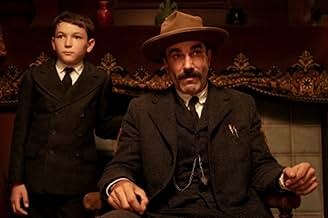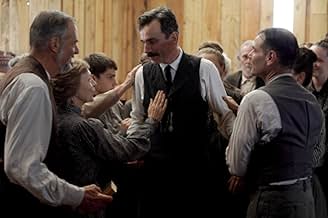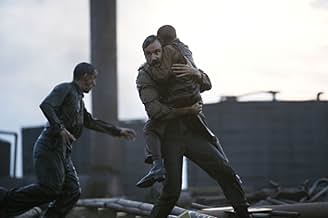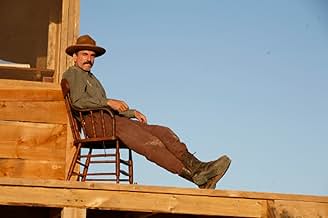डेनियल प्लेनव्यू, एक ऑयल प्रोस्पेक्टर है जो सबसे शक्तिशाली ऑयल टाइकून बनने की चाह में अपने दत्तक बेटे का भी इस्तेमाल करता है.डेनियल प्लेनव्यू, एक ऑयल प्रोस्पेक्टर है जो सबसे शक्तिशाली ऑयल टाइकून बनने की चाह में अपने दत्तक बेटे का भी इस्तेमाल करता है.डेनियल प्लेनव्यू, एक ऑयल प्रोस्पेक्टर है जो सबसे शक्तिशाली ऑयल टाइकून बनने की चाह में अपने दत्तक बेटे का भी इस्तेमाल करता है.
- निर्देशक
- लेखक
- स्टार
- 2 ऑस्कर जीते
- 114 जीत और कुल 138 नामांकन
सारांश
फ़ीचर्ड समीक्षाएं
Ushering in a near dialogue-free opening 15 minutes with a distinct fade-in, Anderson wastes no time in introducing us to the protagonist. Daniel Day-Lewis plays no scratch that Daniel Day-Lewis is Daniel Plainview. An ambitious, moustached miner who, while thrashing away at the crust of his motherland- at the turn of the twentieth century- strikes oil. A profitable discovery that fortuitously leads him to H.W (Dillon Freasier), a new-born infant of whom he slots forcefully under his oil sodden wing only to drag about the entire continent in search of large segments of land in which crude oil is stirring directly beneath. Soon enough, Plainview forges a blossoming "family" oil drilling corporation that soon establishes itself as a force in the industry and prospects appear even brighter when, in 1911, Plainview receives a generously eerie, yet pricey tip-off as to where there may be a sturdy supply of his beloved oil. A tip-off in which he pursues like a unwavering moth to an oil fuelled flame as he meanders ominously into Little Boston, California where the true colours of the indomitable oil baron edge disturbingly into light.
Daniel Plainview is an angry, vengeful man whose promises and loyalties to those around him are as false and as futile as his love and respect for God. He "guarantees" the people of the Little Boston ranch; food, water, schools and, to the town's radically odd preacher Eli Sunday (an inspired Paul Dano), a newly renovated church of the Third Revelation. But he cares little for the reserving of his pledges and spends little time guilt-tripping over his numerous acts of iniquity. "I look at people," he says "and I see nothing worth liking." "I have a competition in me," he continues "and I want no one else to succeed". Self-centred sociopath? Yep, for Plainview is as putrid and as predatory as any character to ever grace the big screen. He putrefies slowly, though. The end product appearing more entity than man. Better yet: an egocentric emblem of evil that governs the screen in an implausible manner in which only an actor of Day-Lewis' calibre can. The sheer potency of his flawless portrayal actually carries the relatively toothless narrative in areas which could be further criticised for chugging along at a near crawling pace at times.
Visually and acoustically, though, TWBB is outstanding- every nuance of every aural and cinematic component work so well with one another to help give the film such power and impact. It's just a shame that no real direction or purpose bled into the screenplay for which Anderson adapted from Upton Sinclair's 1927 novel- Oil. As far as storytelling goes, Anderson has underperformed here. His narrative lacks any legitimate path or hooks and, to be honest, the lack of defining moments- bar the infamous confession and milkshake scenes- within 158 minute running length is a little disappointing. But the manner in which Day-Lewis dictates the audiences' attention more or less vanquishes any negative thoughts regarding the muscle of the plot. Which is why it comes as no surprise that everybody and their brother have duly commended the London-born method actor's impeccable, Oscar winning performance: the epitome of everything grand about Anderson's fifth but not quite finest feature yet; profound, provoking, intense, immense.
In spite of its flaws, TWBB is still an exceptionally powerful piece of cinema that'll remain etched in the minds of those who take to it for quite some time. Even if it's quality is not there for all to see, in plain view.
The plot is definitely off the beaten track anf the writing very very much a breath of fresh air.
Unfortunately this is a film that can come down to tastes quite a bit when the reviews come round, and although I can't necessarily critique it specifically, there is something about it that I just couldn't get gripped by, and the ending didn't truly satisfy me (though the end scene itself is probably the high point of the movie. Confusing review, I know)
This is not a negative review by any means, but 8-10 are reserved for films that truly get you talking, or have a huge emotional impact in my opinion
As a recommendation, this film is a definite yes. I believe that I am on the side of people who this genre doesn't appeal to much at all, but as a piece of film and a showcase of acting, it is utterly utterly great.
There's so much to say about this movie but it left me speechless at the end, Daniel Day-Lewis was hypnotic, giving a performance that reminded me of Orson Welles in "Citizen Kane", and Humphrey Bogart in "The Treasure of the Sierra Madre" ... He's definitely one of the greatest actors of his generation, especially in this performance that probably best defines the alienating effect of materialism. The 40's had Charles Foster Kane, the 80's had Gordon Gekko and the 2000's have Daniel Planview.
Indeed, "There Will be Blood" is not your typical 'soul corrupted by money and/or power' drama, as I said, it's all about materialism, ending with a pocket filled by gold and a heart made of the same stone you've been working on all your life, it's trusting anything that has a specific color, a specific smell, working on a land to find a greasy black liquid gushing from its womb, and never, never trusting or giving any credit to "nothingness" or "abstraction".
Daniel Plainview considers these abstractions with the most profound disdain. Nothing is free, nothing comes from nothing, nothing is unsubstantial. If one claims to be your brother, he has to prove it, if one should make a deal with you, he should talk business and not about education ... not because it's personal, not because it has nothing to do with business, BUT because it is NOTHING and nothingness irritates Plainview as if the only thing he could believe on had to be material. The rest is nothing, feelings are nothing, believing is nothing, these so strong and noble words for us, well, Plainview doesn't give a damn about them...
And more than anything, above all these abstractions, there is religion, God is Daniel Plainview's archenemy this is the ultimate masquerade for him, the cancer that gangrenes the progress, an evil that transforms people into sheep, almost like animals, the biggest hypocrisy of all Plainview, the capitalist, almost shares the same opinion than Marx who thought religion was people's opium. And because Plainview despises this hypocrisy, he tries to exorcise his hatred by using religion to achieve his plans, exploiting it, like he exploited his adopted son. No feelings, no sentiments, everything should serve a palpable purpose. The end justifies the means.
And ultimately, he gets rich at the end, he's a respected and feared tycoon, as the purest and most implacable illustration of the American dream. But is he happy? no! because power, prosperity, those are still empty words ... he believes in material, in things, in stuff he drinks like the iconic 'milk-shake' metaphor that still resonates in my mind as one of the most memorable hymns to greed and pragmatism. Plainview is greedy, but not evil, evil is still too abstract a word; because it implies the use of one own conscience while Plainview's conscience was dedicated to one goal: getting bigger, possession, expansion, territoriality.
And are we to blame him? Let's not forget the bleak cinematography at the beginning of the film where we could feel, the stink of the oil, the hardness of the rocks and the land as an incontrollable enemy ... let's not forget that Plainview spent half of his life stuck alone into dark holes made of land, stone, metal, oil, and raw matter, so close he could almost feel them, so close it became a part of him ...
"There Will Be Blood" is the quintessential film about materialism and its alienating power, when all that matters is matter!
क्या आपको पता है
- ट्रिवियाDillon Freasier (who plays H.W. Plainview, the son of the character played by Sir Daniel Day-Lewis) was not an actor; he was an elementary student near the film's West Texas shooting location. On the radio program "Fresh Air with Terry Gross," Paul Thomas Anderson told Gross that when the production was trying to convince Dillon's mother to allow Dillon to be in the movie, his mother wanted to figure out who Day-Lewis was, so she rented a copy of Gangs of New York (2002) (in which Day-Lewis plays a murderous gang leader nicknamed "The Butcher"). She panicked at the idea of her son spending time with the man she saw in that movie, so the 'There Will Be Blood' casting department rushed to her a copy of द ऐज ऑफ़ इनोसेंस (1993), in which Day-Lewis plays a civilized and gentle man.
- गूफ़When Eli Sunday lists the towns he will be visiting on his mission, he includes Taft, which would have been named Moron until the 1920s.
- भाव
Eli Sunday: Why are you talking about Paul?
Daniel Plainview: I did what your brother couldn't.
Eli Sunday: Don't say this to me.
Daniel Plainview: I broke you and I beat you. It was Paul who told me about you. He's the prophet. He's the smart one. He knew what was there and he found me to take it out of the ground, and you know what the funny thing is? Listen... listen... listen... I paid him ten thousand dollars, cash in hand, just like that. He has his own company now. A prosperous little business. Three wells producing. Five thousand dollars a week.
[Eli cries]
Daniel Plainview: Stop crying, you sniveling ass! Stop your nonsense. You're just the afterbirth, Eli.
Eli Sunday: No...
Daniel Plainview: You slithered out of your mother's filth.
Eli Sunday: No.
Daniel Plainview: They should have put you in a glass jar on a mantlepiece. Where were you when Paul was suckling at his mother's teat? Where were you? Who was nursing you, poor Eli? One of Bandy's sows? That land has been had. Nothing you can do about it. It's gone. It's had.
Eli Sunday: If you would just take...
Daniel Plainview: You lose.
Eli Sunday: ...this lease, Daniel...
Daniel Plainview: Drainage! Drainage, Eli, you boy. Drained dry. I'm so sorry. Here, if you have a milkshake, and I have a milkshake, and I have a straw. There it is, that's a straw, you see? Watch it. Now, my straw reaches acroooooooss the room and starts to drink your milkshake. I... drink... your... milkshake!
[sucking sound]
Daniel Plainview: I drink it up!
Eli Sunday: Don't bully me, Daniel!
[Daniel roars and throws Eli across the room]
Daniel Plainview: Did you think your song and dance and your superstition would help you, Eli? I am the Third Revelation! I am who the Lord has chosen!
- क्रेज़ी क्रेडिटThere are no opening credits, except for the title.
- कनेक्शनFeatured in Siskel & Ebert & the Movies: The Best of 2007 (2007)
- साउंडट्रैकPopcorn Superhet Receiver
Composed by Jonny Greenwood
Performed by BBC Concert Orchestra (as The BBC Concert Orchestra)
Conducted by Robert Ziegler
टॉप पसंद
- How long is There Will Be Blood?Alexa द्वारा संचालित
- Is "There Will be Blood" based on a book?
- Why does Daniel turn down the contract at the beginning of the film?
- Why are Paul and Eli Sunday played by the same actor?
विवरण
- रिलीज़ की तारीख़
- कंट्री ऑफ़ ओरिजिन
- आधिकारिक साइटें
- भाषाएं
- इस रूप में भी जाना जाता है
- Petróleo sangriento
- फ़िल्माने की जगहें
- उत्पादन कंपनियां
- IMDbPro पर और कंपनी क्रेडिट देखें
बॉक्स ऑफ़िस
- बजट
- $2,50,00,000(अनुमानित)
- US और कनाडा में सकल
- $4,02,22,514
- US और कनाडा में पहले सप्ताह में कुल कमाई
- $1,90,739
- 30 दिस॰ 2007
- दुनिया भर में सकल
- $7,64,30,381
- चलने की अवधि2 घंटे 38 मिनट
- रंग
- ध्वनि मिश्रण
- पक्ष अनुपात
- 2.39 : 1
इस पेज में योगदान दें




































